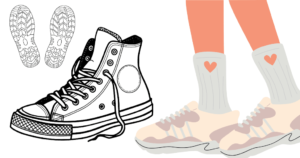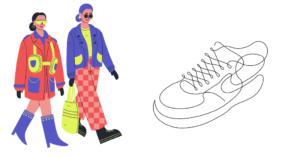 |
| Should Walking Shoes Be Heavy or Light? |
Should Walking Shoes Be Heavy or Light?
Walking is an excellent form of exercise that can improve cardiovascular health, boost mood, and help maintain a healthy weight. Whether you walk for leisure, fitness, or as part of your daily routine, choosing the right walking shoes is crucial. One common question that arises when selecting walking shoes is whether they should be heavy or light. In this article, we will explore the factors to consider when making this decision and provide insights to help you choose the ideal weight for your walking shoes.
Importance of Choosing the Right Walking Shoes
Before delving into the debate between heavy and light walking shoes, it’s important to understand why selecting the right footwear matters. Walking puts pressure on your feet, joints, and muscles, and wearing improper shoes can lead to discomfort, pain, and even injuries. Well-fitted walking shoes provide the necessary support, cushioning, and stability to ensure a comfortable walking experience and minimize the risk of foot-related problems.
Factors to Consider When Choosing Walking Shoes
When selecting walking shoes, several factors should be taken into consideration. These include comfort and fit, weight of the shoes, cushioning and support, durability, breathability, and traction. Each of these factors contributes to the overall walking experience and can impact your foot health and performance.
The Debate: Heavy vs. Light Walking Shoes
The debate surrounding the weight of walking shoes often centers around the advantages and disadvantages of heavy and light footwear options. Let’s explore the pros and cons of each:
Pros and Cons of Heavy Walking Shoes
Heavy walking shoes offer certain benefits. They are generally more durable and can provide increased stability and support, making them suitable for individuals with certain foot conditions or those who require extra protection. However, heavy shoes can also be more cumbersome and may lead to increased fatigue, especially during longer walks. They may limit mobility and hinder agility, which can affect the overall walking experience.
 |
| Should Walking Shoes Be Heavy or Light |
Pros and Cons of Light Walking Shoes
On the other hand, light walking shoes have their own advantages. They are typically more flexible and allow for greater freedom of movement. Lighter shoes can enhance speed and agility, making them a preferred choice for those focusing on fitness or
Benefits of Light Walking Shoes
Light walking shoes have gained popularity among walkers for several reasons. Let’s explore the benefits they offer:
Enhanced Mobility and Speed: Light shoes allow for more natural movement and agility, enabling walkers to maintain a quicker pace. They minimize restrictions and promote a smoother stride, resulting in improved mobility.
Reduced Fatigue: The lightweight construction of these shoes reduces the strain on your feet and legs, making them less tiring to wear. With less weight to carry, you can walk longer distances without feeling as fatigued.
Improved Agility and Flexibility: Light walking shoes are designed to be more flexible, allowing your feet to move more naturally. This enhances your balance and agility, making it easier to navigate different terrains and obstacles.
Easier Travel and Packing: If you frequently travel or participate in walking events, having lightweight shoes can be advantageous. They take up less space in your luggage and are generally easier to pack. You can also wear them comfortably for extended periods during your journey.
Benefits of Heavy Walking Shoes
While light walking shoes have their advantages, heavy walking shoes also serve a purpose for certain individuals. Consider the following benefits:
Increased Stability and Support: Heavy shoes typically offer a higher level of stability and support due to their construction and added features. This can be beneficial for individuals with foot conditions like overpronation or those who require additional support for their arches.
Enhanced Protection and Durability: The added weight in heavy walking shoes often comes from extra layers of cushioning and materials. This provides better protection for your feet against impact and increases the durability of the shoes, making them suitable for more rugged terrains.
Improved Shock Absorption: The extra cushioning and weight in heavy shoes help absorb shock during walking, reducing the impact on your joints and muscles. This can be particularly beneficial for individuals with joint or knee issues.
Suitable for Certain Foot Conditions: Some foot conditions, such as plantar fasciitis or Achilles tendonitis, may require shoes with more structure and support. Heavy walking shoes can offer the necessary stability and cushioning to alleviate discomfort and promote proper foot alignment.
Finding the Right Balance
When deciding between heavy and light walking shoes, it’s crucial to find the right balance that suits your needs. Consider the following factors:
Considerations for Different Walking Purposes: Determine your primary walking purpose. If you prioritize speed, agility, and flexibility, light walking shoes might be the better choice. If you require additional support or have specific foot conditions, heavier shoes can provide the necessary stability and protection.
The Importance of Trying Shoes On: Regardless of weight, it’s essential to try on different shoes to assess their fit, comfort, and overall feel. Walk around the store or your home to gauge how they perform and whether they meet your specific requirements.
Seek Expert Advice if Needed: If you have specific foot concerns or are unsure which type of shoe would be best for you, consult a podiatrist or a knowledgeable footwear specialist. They can assess your feet and walking style to provide personalized recommendations.
 |
| Should Walking Shoes Be Heavy or Light |
Maintenance and Care for Walking Shoes
Once you’ve chosen the right walking shoes, it’s important to maintain them properly for longevity and performance. Here are some maintenance tips:
Cleaning and Storage: Follow the manufacturer’s instructions for cleaning your shoes. Use a soft brush or cloth to remove dirt and debris. Allow them to air dry naturally, away from direct heat. Store them in a cool, dry place to prevent moisture buildup and potential damage.
Replacing Worn-Out Shoes: Pay attention to the wear and tear of your walking shoes. When they start to show significant signs of wear, such as worn-out soles or decreased cushioning, it’s time to replace them. Wearing worn-out shoes can compromise their effectiveness and increase the risk of discomfort or injury.
Regular Inspections: Periodically check your walking shoes for any signs of damage or wear. Look for loose stitching, worn-out outsoles, or deteriorating cushioning. Address any issues promptly to maintain the performance and integrity of your shoes.
When it comes to choosing walking shoes, the debate between heavy and light options can be subjective. Both have their advantages and considerations. Light walking shoes offer enhanced mobility, reduced fatigue, and improved agility, while heavy walking shoes provide increased stability, protection, and support. Ultimately, the decision should be based on your specific needs, walking style, and comfort preferences. Take the time to try on different shoes, consider expert advice if necessary, and prioritize maintaining your chosen pair to ensure a comfortable and enjoyable walking experience.
FAQs
1. Are heavy walking shoes suitable for long-distance walking?
Heavy walking shoes can be suitable for long-distance walking, especially if you require additional support or have specific foot conditions. However, it’s important to prioritize comfort and find a pair that suits your walking style and preferences.
2. Do light walking shoes provide enough cushioning?
Light walking shoes can provide adequate cushioning, although the level of cushioning may vary between different models. It’s recommended to try on different pairs to ensure they provide the necessary comfort and support for your feet.
3. Can I wear heavy walking shoes for everyday use?
Heavy walking shoes can be worn for everyday use if they provide the necessary comfort and support for your feet. However, keep in mind that heavier shoes may feel more cumbersome during daily work time.
